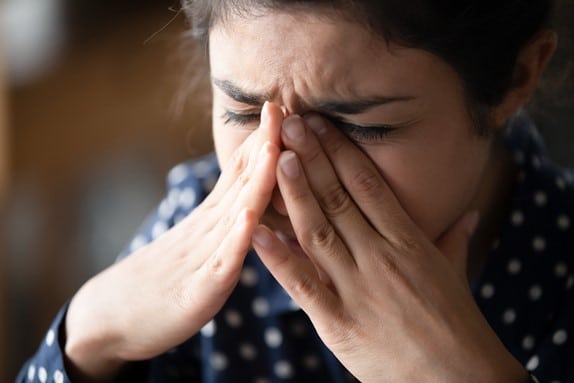Depression Test For Teens
As if parents didn’t have enough to worry about in 2020, early data now reveals mounting teen mental health concerns. Teen depression was on the rise before COVID-19 hit. Now with increased teen depression rates, the focus on suicide prevention should be front and center. Indeed, suicide is the second leading cause of preventable death in this age group.
Unfortunately, the longer depression is allowed to fester, the more risk there is of a more serious outcome. The PHQ-9 can reveal whether a teen is in a depressive episode. The questions on the PHQ-9 are derived from the DSM-5 manual. Mental health workers use the DSM-5 to see if someone has met the criteria for depression. The PHQ-9 depression test for teens can help parents proceed toward seeking out mental health treatment for their teen.
About Teen Depression
The symptoms of depression happen to be common traits in teens anyway. This makes it hard to know if the symptoms are a mental health issue or typical teen stressors. Shifts in hormones and the typical teen social drama mean that teens are naturally moody. But when the teen’s depressed state escalates or does not subside in two weeks, it is cause for concern. Prolonged depression may lead the teen to hide away at home. The teen may have trouble doing simple daily tasks, and depression can increase the risk of suicide.
Symptoms of teen depression involve:
- Constantly feeling sad or hopeless.
- Feeling irritable.
- Trouble staying focused.
- Feeling very tired all the time.
- A decline in grades.
- Lack of interest in things they once enjoyed.
- More frequent crying spells.
- Angry outbursts.
- Slowed thinking and/or motor movements.
- Changes in eating habits, sudden weight gain or loss.
- Changes in sleeping habits.
- Withdraw from friends and family.
- Thoughts of death or suicide.
The NIMH reports that 5 million teens ages 12-17 have had at least one depressive episode in their young lives. Among girls, almost 30% have had depression. 74% of depressed teens will experience severe impairment.
Causes of Teen Depression
There are many things that could spark depression in a teen. School stressors can become too much for a teen. There is so much pressure on them to succeed and go to college. Social struggles are also a common problem among teens. Social media shaming, bullying, gender issues, or difficulty fitting in can lead to feelings of despair.
Family problems, such as a divorce, moving, or a parent losing their job can be factors. Also, grief and loss if a loved one dies may be overwhelming for a young person. A teen with a history of abuse, neglect, or other mistreatment is at a higher risk of depression as well. Added to these factors, biology also plays a part in teen depression. When a close family member has depression there is a higher chance of other family members also struggling with it.
During the post COVID-19 era, many teens are struggling. They feel that their futures are now uncertain. The teen years usually involve planning for college and setting life goals, but that is now on hold. Feeling such uncertainty has added an extra layer of angst for teens.
Teen Depression and Self-Harm or Suicide Risk
Teens may engage in self-harm as a way to release the feelings they are struggling with. Self-harm is also done as a way to gain some sense of control in their life. Self-harm is not about seeking attention. Instead, self-harming behaviors become a sort of coping skill. However, teens that do engage in self-harm are at a higher risk for suicide attempts or suicide.
Depression can increase the risk of suicide by 12-fold, especially when a teen feels hopeless. Teen suicide is on the rise, even in the very young middle school age group. Be alert to signs like being obsessed about death, or stating that you’d be better off without them. The teen might be giving away their prized possessions, or have completely pulled away from their friends. Parents need to be on the lookout for pills or a weapon that the teen might have obtained.
Spotting the Danger Signs of Teen Depression
Teens who struggle with depression may not have the coping tools yet to manage their emotional state. As a result of their mental health struggle, teens may have poor outcomes. They may begin to use drugs or alcohol, stop going to school, or they may even leave home. These would be an unhealthy response to the depression, and will only add to their despair.
These are the more extreme signs of depression in a teen. Parents who are able to spot less severe signs of distress will be able to get their teen help sooner. Added to the classic depression symptoms listed above, some of the other warning signs include:
- Mood swings.
- Excessive sleeping.
- Engaging in high-risk behaviors.
- Neglects hygiene or appearance.
- The rapid decline in grades.
Residential Psychiatric Treatment for Teen Depression
Residential treatment is the right level of care for teens that have not had relief from depression through outpatient care. These teens may see their mental health getting worse. They may have impaired functioning, social problems, poor grades, truancy, and increased social withdrawal. The residential mental health program offers more tailored treatment. This allows the teen to engage more deeply in their treatment and focus on getting better.
These teen depression treatment programs create highly customized plans to help the teen overcome depressive disorder. Daily activities include:
- Talk therapy sessions.
- Group therapy sessions.
- Family-focused therapy sessions.
- Experiential activities, such as outdoor sports and outings.
- Holistic therapies, such as yoga and mindfulness training.
- Academic support.
- Medication management.
- Medical detox, if needed.
Teens who struggle with depression will find this setting provides a chance to take a break from their daily life. This way they can devote their energy and time to treatment. For teens with severe depression, the residential program offers a comprehensive approach to reclaiming wellness.
BNI Treatment Centers Residential Treatment for Teens
BNI Treatment Center is an L.A.-based residential mental health program for teens in distress. At BNI Treatment the doctors provide in depth testing for depression and other mental health conditions specializing in teen psychiatric care. After a thorough assessment, a tailored treatment plan is designed. If your teen answered five or more questions “yes” on the depression test for teens, reach out to BNI today at (888) 522-1504.






